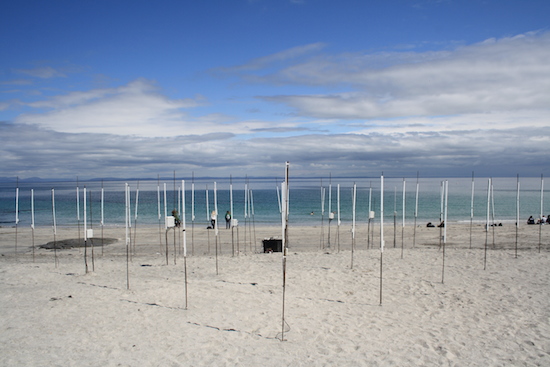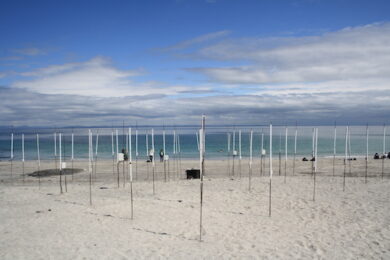Salt off the sea whets the blades of four winds.
Some faces on the ferry are beginning to turn sour as we pitch about in the waves of the Atlantic. On deck, several of our travelling party are getting soaked by the spray. Rough-skinned men in navy jumpers and blue jeans move quickly about the place, criu written on their backs. The ferry is much busier than usual as the traditional passengers, islanders heading home, mix with people in search of something else entirely. The passage is worst just after we leave Inis Meáin, edging around An Súnda Salach, the Foul Sound, and towards our destination, Inis Oírr.
On arrival, we are greeted by a dolphin and bundled into a van. We’re staying in Barbara’s, a house called Lios Einne. The atmosphere is familiar, as it would be to anyone who spent time in the Gaeltacht as a teenager; quiet and efficient, with two parties trying not to get in each other’s way. There’s a scale model of a Galway hooker in the three-tabled dining room, its red sails set for the wind. A black and white photo of Barbara’s father, standing with another man beside a currach, is framed above it.
Áras Éanna, the local arts centre, sits on top of a hill on the north west corner of the island. When we arrive, the sun is close to setting and the view from the top of the centre’s steps, overlooking Inish Meáin and Inis Mór behind it, is breathtaking. Inside, the small performance space is packed full as people crowd in to hear the opening speech. Rich Gilligan’s photos are upstairs, a series of shots on Dublin’s hidden places and the intimate moments of its working class communities. Their urban sensibility might feel strange here, but there are no windows in this room and, for a moment, the place seems like any other busy exhibition opening in the capital.
The designer clothes for sale downstairs do little to shake this feeling, but it only takes a step outside for the island to reassert itself. A boy called Embrz is playing his first ever gig back in the theatre. There are moments, especially in the last song, that bring to mind How To Dress Well at his least twisted, his least impressionistic, but this music needs some more time to mature into something more original.
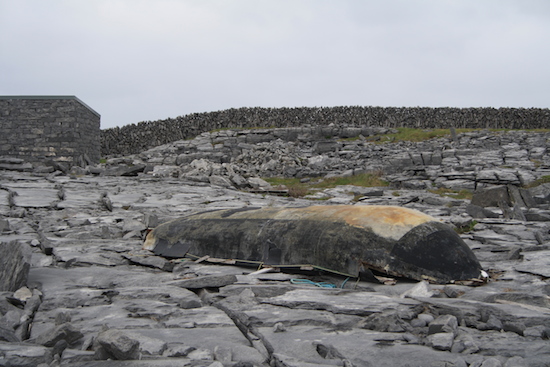
We head for the beach in the very last of the light. Super/Collider are finishing the installation of one of their HyBrasil – Newfoundlight pieces, a triangular formation of lights staked into the sand, but it’s the distant lights on the mainland that are most captivating tonight. All along the Connemara coast, you can see the enclaves of human habitation pin-pricked in the darkness. The sky is huge above them and the sea impassive below. The wind blows huge clouds towards the mountains on the far side of the bay. It is quite a while before we tear ourselves away from the sight of it.
We get lost hoping to find the old school hall and end up in the pub with pints of good Guinness and some Pringles. There’s a group of musicians in the corner by the fire playing old standards. When one starts into ‘Hand Me Down My Bible’, I think of my father and how this is the only song we’ve ever tried to play together. The ceiling is covered in flags from far-flung places, the walls in photos, maps and a JFK tapestry. The American flag is twice as big as all the others. We stay and listen a while but call it a night before the DJ starts up in the back room.
Did sea define the land or land the sea?
We’re up early for breakfast on Saturday morning and the weather is grey. It’s not raining but it might and the wind is worse than when we arrived. After a fry and some tea, we set off for the far end of the island, towards its south-western tip. Most of the houses on the island are clustered around the north coast, near the pier and the beach. A few minutes walk takes you beyond the last house, perched alone on the edge, far from the others, an erratic. There is little but field after rock-filled field beyond it. The patterns of the walls seem arbitrary, creating tiny enclosures for, at most, a handful of cattle. Most of them lie empty.
From the end of the road, the horizon extends unbroken across our line of sight. It feels like the edge of the world. A pair of small birds become frantic as we approach, flying around us and calling to each other as if to say, "Careful! The humans are here!".
We turn back and take a path that runs right up the coast. If the fields are full of stone, then the coast is made of it. The limestone is piled high against the ocean, sometimes towering over our heads. There are slabs of it, clints, laid out in front of us and fissured with grykes. Thousands of years of exposure to the Atlantic has left the soft stone full of holes. The useful bits of rock now make up the walls that define the landscape, and the rest are here. There are sculptures erected along the stone coast as more parts of the Skyhenge installation. They are supposed to be sought out at particular times over the weekend but now, in the grey nothing of mid-morning, they are like pagan offerings, remnants of long forgotten rites. We come across tangled netting and an old currach and then a monument to remember those who have died at sea. Looking out now across the grey vastness, the waves breaking against this island and the next, it’s hard not to shudder at how vulnerable they were. To be out there, for hours and days, in what J.M. Synge described as "a rude canvas canoe", must take a courage I will never know.
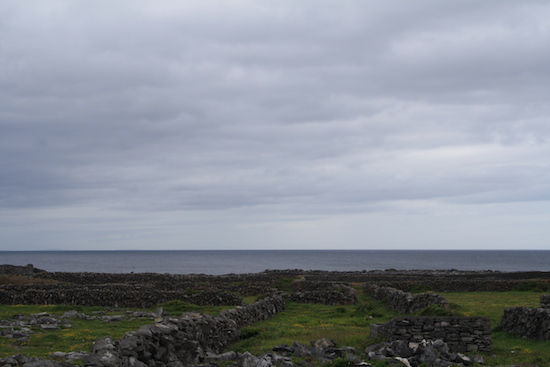
Our path takes us back to Áras Eanna, where the men behind the Four Bothies project are telling us about what they’ve done. Four secret shelters scattered across Ireland, hidden away in wild places. A library, a studio, a study and a gallery, and no directions to any of them. By the end, the project begins to feel like a well-meaning example of the human need to prioritise our own story over all others, to own the land we walk on, to control and limit it. I think of Richard Skelton’s misgivings about his own work in Hilltown last year and how we can operate at different levels of consciousness in our surroundings. Most of us in the room will never look for these bothies but finding them was never the point; building them was. So who was it for?
After lunch we visit Teampall Caomhán, the church of the island’s patron saint. It has been unearthed from the sand blown in from the sea and now sits, still below ground level, on a hill to the east of the beach. From there, we carry on south and climb higher still on paths that wind through old houses up towards O’Brien’s Castle. The castle itself is a ruin, but it stands on the island’s highest point and affords a spectacular view. Sitting on the grass outside the ruined castle, my mind turns again to bravery and courage. The Four Bothies crew brought up the great explorers, Shackleton and Mallory, and linked that spirit with their own. I think of St Brendan, sailing into that same endless ocean with faith that there would be an end, and he would be protected.
I think of this festival and why we’re here. It is a brave event, filled with an adventurous and sympathetic spirit. It isn’t a bunch of mainlanders arriving for a piss-up on a picturesque island. It never feels like the festival has taken over what is natural to the island, but rather brought us here to see it in its own, unreflected light. It doesn’t cave to a traditional view of the island, nor does it impose an unwanted vision of now. It is brave to resist dominance – the spectacular, the extraordinary – in favour of a more subtle integration. The festival feels of a piece with the place. This is what makes Drop Everything such a beautifully realised and courageous idea.
Walking back from the castle, we catch a glimpse of the rusted husk of the Plassey, shipwrecked on the southeastern coast. No one died in the wreck because a group of islanders, the Inisheer Rocket Crew, saved them using a breeches buoy. Courage runs as deep as the rock in these fields.
Our hiking has made us hungry and dinner is provided by Ard Bia. Fresh fish and mussels, fine salads, beautiful bread and the most delicious ice-cream I’ve ever tasted. Not the average mid-festival meal. A poitín and rhubarb cocktail isn’t the average mid-festival drink either but that’s nearly as good as the dinner. It’s music for the evening then, with Somerville the highlight in Áras Eanna, earning the only calls for an encore heard all weekend. On the beach, sound is added to light as rough, looping drones emanate from klaxons on the dunes and Skyhenge shines white in the darkness.
In the back room of the hotel pub, they’ve brought in a big PA and White Collar Boy are getting the crowd warmed up, though no one seems to need much help at this stage. The atmosphere is beautiful and soon the music meets it as Colin Finnegan unloads a bag full of tough, Dutch-sounding house and some disco classics. Bande Apartment’s ‘Lubricating Rita’ is a personal highlight, as it always is. There are few finer DJs than Kenefick in Ireland and tonight he’s on top form; his set is seamless and expertly paced.
We walk home at literal cockcrow from a house near the graveyard where a group of revellers are looking for change for the electricity meter.
Strange, it is a huge nothing that we fear
Sitting alone at the breakfast table on Sunday morning, listening to the sound of a mass coming through the radio in the kitchen. To be here when the sun is shining is a blessing. All at once the small fields are alive with flowers, birds and white-winged butterflies. It seems the whole island is out of doors, walking dogs on the winding road. The waves break east along the beach. The water rolls in, clear as sky, the blue gift of the bay. Kids and dogs are running up and down, through Skyhenge and as far into the surf as their legs will take them. There are people on the pier but none have taken a plunge, as long as I’ve been watching. A King Charles we made friends with on Saturday is rolling around in the sand, standing guard over the waves. The beach quietens as thoughts of Sunday dinner take hold of whole families, their appetites well earned, and young girls walk barefoot across the sand and stone toward home.
We walk the opposite way. East towards the handball alley, where Sougwen Chung’s installation of light and sound, ECDYSIS, was sitting in the dark, inactive. The alley is cold and windowless, resisting all the heat of the morning. Apparently a laptop is down, and there’ll be no light or sound for us. We bend back through the half-height door and readjust to the sun. Further up the hill, a small cottage has rickety tables painted colourful in the grass outside. Tea and cakes are being served, and we buy a St. Brigid’s Cross, woven with reeds, to complement the excellent chocolate biscuit cake. There is a feeling of utter calm in that front garden, where native voices mix with those of blow-ins, some here for the weekend, some for much longer, speaking in halting Irish.
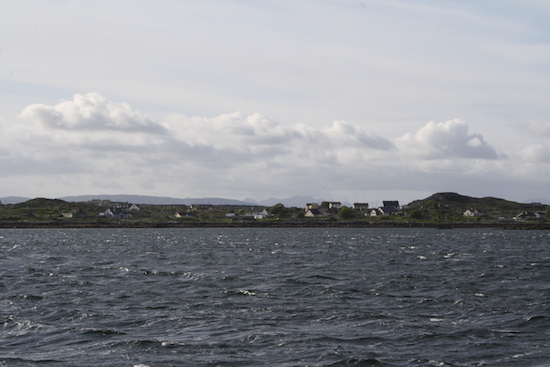
The front room of the cottage is another that resists the morning. The smell of long-burned peat has achieved permanence in the air, a soft and welcome feeling as you cross the threshold. The bare stone walls cool the interior and a fireplace in the old style dominates one side, a hearth near the whole width of the room.
There is little left for us to do on Sunday afternoon, our boat leaves at half past four and we have missed the Fumbally brunch on the rocks near the beach. We overhear stories of porridge wrapped in seaweed and cooked in a hole in the ground, a fulacht fiadh. The ancient method feels out of place here; for all its stone walls and cottages, this is not a place that fetishizes the past. Back at Barbara’s, we hear our host and an old man, perhaps her father, talking to a relative on Skype. They all move easily between Irish and English, switching mid-sentence when it serves. The digitised rendering of a faraway voice is a reminder that the old distances are not what they were, even here.
Down at the pier, people are gathering, splitting. Some stay, some to Galway, some to Doolin aboard the Doolin Discovery. There’s a busy chip van by the pier and the sounds of a nascent party carry from a little further up the coast. The weekend isn’t over for everyone.
Our ferry leaves on schedule, or thereabouts. The ocean is calm now and there is barely sense of movement at all. We watch small birds search for fish on the Atlantic surface, dipping their heads below the mellow waves.
We arrived to find the coast aflame. The fire brigade passed us by, sirens blaring, as we drove on through the pitiless rock and swamp east of Ros an Mhíl.

